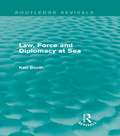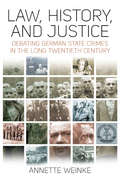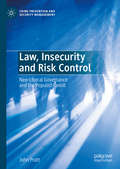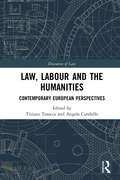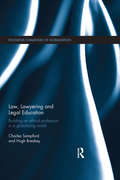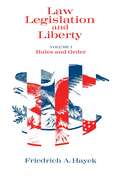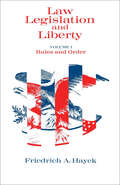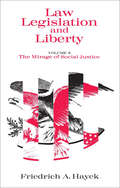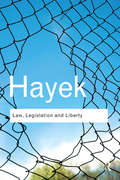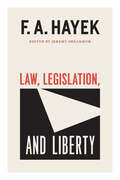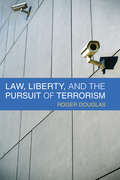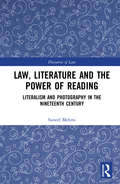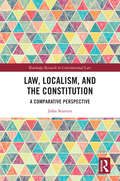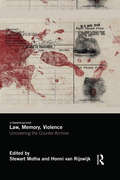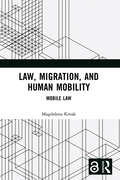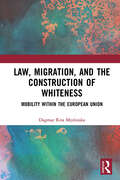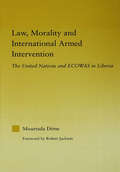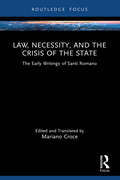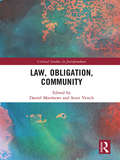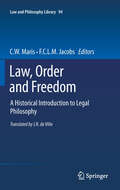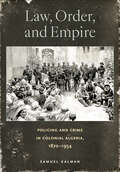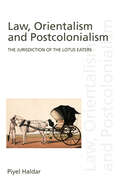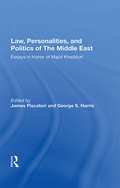- Table View
- List View
Law, Force and Diplomacy at Sea (Routledge Revivals)
by Ken BoothLaw, Force and Diplomacy at Sea, first published in 1985, is one of the few comprehensive treatments on the subject from a strategic perspective. It offers a detailed strategic analysis of the background and outcome of the Third UN Conference on the Law of the Sea, and its naval implications. The interplay between the interest of the naval powers in freedom of navigation and the interest of coastal states in control provides the setting for the strategic problems. The sea is taking on more properties of the land: it is becoming ‘territorialised’, and this is presenting fresh challenges and opportunities to which navies and their national governments have to respond. This study is designed for students of naval strategy, for international lawyers and for students of international affairs who wish to think about the important security questions in the maritime environment.
Law, History, and Justice: Debating German State Crimes in the Long Twentieth Century
by Annette WeinkeSince the nineteenth century, the development of international humanitarian law has been marked by complex entanglements of legal theory, historical trauma, criminal prosecution, historiography, and politics. All of these factors have played a role in changing views on the applicability of international law and human-rights ideas to state-organized violence, which in turn have been largely driven by transnational responses to German state crimes. Here, Annette Weinke gives a groundbreaking long-term history of the political, legal and academic debates concerning German state and mass violence in the First World War, during the National Socialist era and the Holocaust, and under the GDR.
Law, History, and Justice: Debating German State Crimes in the Long Twentieth Century
by Annette WeinkeSince the nineteenth century, the development of international humanitarian law has been marked by complex entanglements of legal theory, historical trauma, criminal prosecution, historiography, and politics. All of these factors have played a role in changing views on the applicability of international law and human-rights ideas to state-organized violence, which in turn have been largely driven by transnational responses to German state crimes. Here, Annette Weinke gives a groundbreaking long-term history of the political, legal and academic debates concerning German state and mass violence in the First World War, during the National Socialist era and the Holocaust, and under the GDR.
Law, Insecurity and Risk Control: Neo-Liberal Governance and the Populist Revolt (Crime Prevention and Security Management)
by John PrattThis book examines our contemporary preoccupation with risk and how criminal law and punishment have been transformed as a result of these anxieties. It adopts an historical approach to examine the development of risk control measures used across the US, UK, New Zealand, Australia and Canada - particularly since the 1980’s - with the rise of the "security sanction". It also takes a criminological and sociological approach to analysing shifts in criminal law and punishment and its implications for contemporary society and criminal justice systems. Law, Insecurity and Risk Control analyses the range and scope of the ‘security sanction’ and its immobilizing measures, ranging from control over minor incivilities to the most serious crimes. Despite these innovations, though, it argues that our anxieties about risk have become so extensive that the "security sanction" is no longer sufficient to provide social stability and cohesion. As a consequence, people have been attracted to the ‘magic’ of populism in a revolt against mainstream politics and organisations of government, as with the EU referendum in the UK and the US presidential election of Donald Trump in 2016. While there have been political manoeuvrings to rein back risk and place new controls on it, these have only brought further disillusionment, insecurity and anxiety. This book argues that the "security sanction" is likely to become more deeply embedded in the criminal justice systems of these societies, as new risks to both the well-being of individuals and the nation state are identified.
Law, Labour and the Humanities: Contemporary European Perspectives
by Angela Condello Tiziano ToraccaThe ontology of work and the economics of value underpin the legal institution, with the existence of modern law predicated upon the subject as labourer. In contemporary Europe, labour is more than a mere economic relationship. Indeed, labour occupies a central position in human existence: since the industrial revolution, it has been the principal criterion of reciprocal recognition and of universal mobilization. This multi-disciplinary volume analyses labour and its depictions in their interaction with the latest legal, socio-economic, political and artistic tendencies. Addressing such issues as deregulation, flexibility, de-industrialization, the pervasive enlargement of markets, digitization and virtual relationships, social polarisation and migratory fluxes, this volume engages with the existential role played by labour in our lives at the conjunction of law and the humanities. This book will be of interest to law students, legal philosophers, theoretical philosophers, political philosophers, social and political theorists, labour studies scholars, and literature and film scholars.
Law, Lawyering and Legal Education: Building an Ethical Profession in a Globalizing World (Challenges of Globalisation)
by Charles Sampford Hugh BreakeyOnce a highly cosmopolitan profession, law was largely domesticated by the demands of the Westphalian state. But as the walls between sovereign states are lowered, law is globalizing in a way that is likely to change law, lawyering and legal education as much over the next 30 years – when the students entering law schools today reach the peak of their profession – as it has over the last 300. This book provides a sustained investigation of the theoretical and practical aspects of legal practice and education, synthesizing and developing nearly thirty years of Professor Sampford’s critical thought, analysis and academic leadership. The book features two major areas of investigation. First, it explains the significance of the ‘critical’, ‘theoretical’ and ‘ethical’ dimensions of legal education and legal practice in making more effective practitioners – placing ethics and values at the heart of the profession. Second, it explores the old/new challenges and opportunities for ethical lawyers. Challenges include those for lawyers working in large organisations dealing with issues from international tax minimisation to advising governments bent on war. Opportunities range from the capacity to give client’s ethical advice to playing a key role in the emergence of an international rule of law as they had to the ‘domestic’ rule of law. The book should stimulate great interest and occasional passion for legal practitioners, students, teachers and researchers of law, lawyering, legal practice and legal institutions. Its inter-disciplinary approaches should be of interest to those with interests in education theory, international relations, political science and government, professional ethics, sociology, public policy and governance studies.
Law, Legislation and Liberty, Volume 1: Rules and Order
by Friedrich A. HayekThis volume represents the first section of comprehensive three-part study of the relations between law and liberty. Rules and Order constructs the framework necessary for a critical analysis of prevailing theories of justice and of the conditions which a constitution securing personal liberty would have to satisfy.
Law, Legislation and Liberty, Volume 1: Rules and Order (Law, Legislation and Liberty)
by Friedrich A. HayekFrom a Nobel Laureate economist, “after more than half a century, Rules and Order remains an essential book for anybody interested in politics or law” (EconLib).F. A. Hayek made many valuable contributions to the field of economics as well as to the disciplines of philosophy and politics. This volume represents the first section of Hayek’s comprehensive three-part study of the relations between law and liberty. Rules and Order constructs the framework necessary for a critical analysis of prevailing theories of justice and of the conditions which a constitution securing personal liberty would have to satisfy.
Law, Legislation and Liberty, Volume 2: The Mirage of Social Justice (Law, Legislation and Liberty)
by Friedrich A. HayekF. A. Hayek made many valuable contributions to the field of economics as well as to the disciplines of philosophy and politics. This volume represents the second of Hayek's comprehensive three-part study of the relations between law and liberty. Here, Hayek expounds his conviction that he continued unexamined pursuit of "social justice" will contribute to the erosion of personal liberties and encourage the advent of totalitarianism.
Law, Legislation and Liberty: A new statement of the liberal principles of justice and political economy (Routledge Classics)
by F. A. HayekWith a new foreword by Paul Kelly 'I regard Hayek's work as a new opening of the most fundamental debate in the field of political philosophy' – Sir Karl Popper 'This promises to be the crowning work of a scholar who has devoted a lifetime to thinking? about society and its values. The entire work must surely amount to an immense contribution to social and legal philosophy' - Philosophical Studies Law, Legislation and Liberty is Hayek's major statement of political philosophy and one of the most ambitious yet subtle defences of a free market society ever written. A robust defence of individual liberty, it is also crucial for understanding Hayek’s influential views concerning the role of the state: far from being an innocent bystander, he argues that the state has an important role to play in defending the norms and practices of an ordered and free society. His arguments had a profound influence on the policies of Thatcher in the 1980s and resonate today in visions of the ‘Big Society’. First published in three separate volumes, this Routledge Classics edition makes one of his most important books available in a single volume. Essential reading for understanding the background to the recent world economic turmoil and financial crisis, it also foreshadows the subsequent heated debate about regulation and political governance if such disasters are to be avoided in the future.
Law, Legislation, and Liberty, Volume 19: A New Statement Of The Liberal Principles Of Justice And Political Economy (Routledge Classics Ser. #19)
by F.A. HayekA new edition of F. A. Hayek’s three-part opus Law, Legislation, and Liberty, collated in a single volume In this critical entry in the University of Chicago’s Collected Works of F. A. Hayek series, political philosopher Jeremy Shearmur collates Hayek’s three-part study of law and liberty and places Hayek’s writings in careful historical context. Incisive and unrestrained, Law, Legislation, and Liberty is Hayek at his late-life best, making it essential reading for understanding the philosopher’s politics and worldview. These three volumes constitute a scaling up of the framework offered in Hayek’s famed The Road to Serfdom. Volume 1, Rules and Order, espouses the virtues of classical liberalism; Volume 2, The Mirage of Social Justice, examines the societal forces that undermine liberalism and, with it, liberalism’s capacity to induce “spontaneous order”; and Volume 3, The Political Order of a Free People, proposes alternatives and interventions against emerging anti-liberal movements, including a rule of law that resides in stasis with personal freedom. Shearmur’s treatment of this challenging work—including an immersive new introduction, a conversion of Hayek’s copious endnotes to footnotes, corrections to Hayek’s references and quotations, and the provision of translations to material that Hayek cited only in languages other than English—lends it new importance and accessibility. Rendered anew for the next generations of scholars, this revision of Hayek’s Law, Legislation, and Liberty is sure to become the standard.
Law, Liberty and State
by Thomas Poole David Dyzenhaus Dyzenhaus, David and Poole, Thomas"Oakeshott, Hayek and Schmitt are associated with a conservative reaction to the 'progressive' forces of the twentieth century. Each was an acute analyst of the juristic form of the modern state and the relationship of that form to the idea of liberty under a system of public, general law. Hayek had the highest regard for Schmitt's understanding of the rule of law state despite Schmitt's hostility to it, and he owed the distinction he drew in his own work between a purpose-governed form of state and a law-governed form to Oakeshott. However, the three have until now rarely been considered together, something which will be ever more apparent as political theorists, lawyers and theorists of international relations turn to the foundational texts of twentieth-century thought at a time when debate about liberal democratic theory might appear to have run out of steam"--
Law, Liberty, and the Pursuit of Terrorism
by Roger DouglasRoger Douglas compares responses to terrorism by five liberal democracies--the United States, the United Kingdom, Canada, Australia, and New Zealand--over the past 15 years. He examines each nation's development and implementation of counterterrorism law, specifically in the areas of information-gathering, the definition of terrorist offenses, due process for the accused, detention, and torture and other forms of coercive questioning. Douglas finds that terrorist attacks elicit pressures for quick responses, often allowing national governments to accrue additional powers. But emergencies are neither a necessary nor a sufficient condition for such laws, which may persist even after fears have eased. He argues that responses are influenced by both institutional interests and prior beliefs, and complicated when the exigencies of office and beliefs point in different directions. He also argues that citizens are wary of government's impingement on civil liberties and that courts exercise their capacity to restrain the legislative and executive branches. Douglas concludes that the worst antiterror excesses have taken place outside of the law rather than within, and that the legacy of 9/11 includes both laws that expand government powers and judicial decisions that limit those very powers.
Law, Literature and the Power of Reading: Literalism and Photography in the Nineteenth Century
by Suneel MehmiAt the intersection of law, literature and history, this book interrogates how a dominant contemporary idea of law emerged out of specific ideas of reading in the nineteenth century. Reading shapes our identities. How we read shapes who we are. Reading also shapes our conceptions of what the law is, because the law is also a practice of reading. Focusing on the works of key Victorian writers closely associated with legal practice, this book addresses the way in which the identity of the reader of law has been modelled on the identity of the political elite. At the same time, it shows how other readers of law have been marginalized. The book thus shows how a construction of the law has emerged from the ordering of a power that discriminates between different readers and readings. More specifically, and in response to the emerging media of photography – and, with it, potentially subversive ideas of exposure and visibility – the book shows that there have been dominant, hidden and unrecognised guides to legal reading and to legal thought. And in making these visible, the book also aims to make them contestable. This secret history of law will appeal to legal historians, legal theorists, those working at the intersection of law and literature and others with interests in law and the visual.
Law, Localism, and the Constitution: A Comparative Perspective (Routledge Research in Constitutional Law)
by John StantonLocal government affects us all. Wherever we live, in towns, cities, villages or in the smallest of communities, there are locally elected councils tasked with representing people’s interests in the running of the local area. This involves, inter alia, providing public services, maintaining local spaces and acting as a level of democratic governance within the broader constitutional and executive structure of the state. To fulfil these responsibilities, though, local government must be democratically legitimate; it must have at its disposal reasonable means and resources to function; and it must enjoy a healthy and balanced relationship with central government. This book explores and analyses the extent to which local government in the different parts of the UK is able to function effectively and democratically. It draws from local councillors’ views in analysing the state of local government under the current constitutional and governmental arrangements, discussing issues such as councils’ relationship with central government; citizen engagement; finance and public services; and the impact of recent reforms. It contrasts and compares the different approaches adopted in England, Scotland, Wales and Northern Ireland, also setting out and discussing possible reforms of local government in the United Kingdom. While the focus is on the UK, the work includes a comparison with other relevant jurisdictions.
Law, Memory, Violence: Uncovering the Counter-Archive
by Stewart Motha Honni Van RijswijkThe demand for recognition, responsibility, and reparations is regularly invoked in the wake of colonialism, genocide, and mass violence: there can be no victims without recognition, no perpetrators without responsibility, and no justice without reparations. Or so it seems from law’s limited repertoire for assembling the archive after ‘the disaster’. Archival and memorial practices are central to contexts where transitional justice, addressing historical wrongs, or reparations are at stake. The archive serves as a repository or ‘storehouse’ of what needs to be gathered and recognised so that it can be left behind in order to inaugurate the future. The archive manifests law’s authority and its troubled conscience. It is an indispensable part of the liberal legal response to biopolitical violence. This collection challenges established approaches to transitional justice by opening up new dialogues about the problem of assembling law’s archive. The volume presents research drawn from multiple jurisdictions that address the following questions. What resists being archived? What spaces and practices of memory - conscious and unconscious - undo legal and sovereign alibis and confessions? And what narrative forms expose the limits of responsibility, recognition, and reparations? By treating the law as an ‘archive’, this book traces the failure of universalised categories such as 'perpetrator', 'victim', 'responsibility', and 'innocence,' posited by the liberal legal state. It thereby uncovers law’s counter-archive as a challenge to established forms of representing and responding to violence.
Law, Migration, and Human Mobility: Mobile Law
by Magdalena KmakThis book analyses the multifaceted ways law operates in the context of human mobility, as well as the ways in which human mobility affects law. Migration law is conventionally understood as a tool to regulate human movement across borders, and to define the rights and limits related to this movement. But drawing upon the emergence and development of the discipline of mobility studies, this book pushes the idea of migration law towards a more general concept of mobility that encompass the various processes, effects, and consequences of movement in a globalized world. In this respect, the book pursues a shift in perspective on how law is understood. Drawing on the concepts of ‘kinology’ and ‘kinopolitics’ developed by Thomas Nail as well as ‘mobility justice’ developed by Mimi Sheller, the book considers movement and motion as a constructive force behind political and social systems; and hence stability that needs to be explained and justified. Tracing the processes through which static forms, such as state, citizenship, or border, are constructed and how they partake in production of differential mobility, the book challenges the conventional understanding of migration law. More specifically, and in revealing its contingent and unstable nature, the book reveals how human mobility is itself constitutive of law. This interdisciplinary book will appeal to those working in the areas of migration and refugee law, citizenship studies, mobility studies, legal theory, and sociolegal studies. The Open Access version of this book, available at www.taylorfrancis.com, has been made available under a Creative Commons Attribution-Non Commercial-No Derivatives (CC-BY-NC-ND) 4.0 license. Funded by University of Helsinki and Åbo Akademi University.
Law, Migration, and the Construction of Whiteness: Mobility Within the European Union
by Dagmar Rita MyslinskaThis book addresses the hidden dynamics of race within the European Union.Brexit supporters’ frequent targeting of European Union (EU) movers, especially those from Central and Eastern Europe, has been popularly assumed as at odds with the EU project’s foundations based on equality and inclusion. This book dispels that notion. By interrogating the history, wording, omissions, assumptions and applications of laws, policies and discourses pertinent to mobility and equality, the argument developed throughout the book is that the parameters of CEE nationals’ status within the EU have been closely circumscribed, in line with the entrenched historical positioning of the west as superior to the east. Engaging current legal, economic, political and moral issues--against the backdrop of Brexit and contestations over EU integration and globalisation--this work opens avenues of thought to better understand law’s role in producing and sustaining social stratifications. Europe is a postcolonial space, as this book demonstrates. By addressing fractures within the construct of whiteness that are based on ethnicity, class and migrant status, the book also provides a theoretically nuanced, and politically useful, understanding of contemporary European racisms.This book will appeal to scholars, students and others interested in migration, EU integration and EU citizenship, equality law, race and ethnicity, social policy, and postcolonialism.
Law, Morality, and International Armed Intervention: The United Nations and ECOWAS (African Studies)
by Mourtada DemeInternational law is often manipulated in the debate about humanitarian intervention. The Liberian case provides an opportunity to challenge the UN and The Economic Community of West African States' (ECOWAS') new approach. ECOWAS and the UN's justifications for moving away from the current norms are flawed. No enlightened person would disagree with the values of peace, democracy, human rights, and economic development. This book, however, explores whether these goals be pursued within the current framework or outside it.
Law, Necessity, and the Crisis of the State: The Early Writings of Santi Romano (Law and Politics)
by Mariano CroceThis book contains the first English translations of Santi Romano’s important essays, ‘On the Decree Laws and the State of Siege During the Earthquakes in Messina and Reggio Calabria’ (1909) and ‘The Modern State and its Crisis’ (1910). Before Santi Romano wrote his masterpiece The Legal Order in 1917–18, he lay the foundations for his ground-breaking theory of law in these two essays, which are still central to scholarly debates about his legacy. The main focus of ‘On the Decree Laws’ is the concept of necessity as a source of law. Such a controversial view anticipated the much more renowned conception of the state of exception advanced later by Carl Schmitt in his Political Theology and has provided a reference point for Giorgio Agamben. The second essay, ‘The Modern State and its Crisis’, is concerned with the emergence of social forces that the early 20th-century administrative state was struggling to tame. Pursuing an insight that he would develop in The Legal Order, Romano argued that a solution could be found in a public law theory that was able to reconcile the need for a shared constitutional frame with the internal orderings of nonstate movements. Indispensable for contemporary scholars to understand how Romano’s most revolutionary notions came about, as well as to fully appreciate the theoretical import of his concept of law, this book will appeal to legal and political theorists and others who are interested in how law deals and should deal with emergencies and social crises.
Law, Obligation, Community (Critical Studies in Jurisprudence)
by Scott Veitch Daniel MatthewsAgainst an ever-expanding and diversifying ‘rights talk’, this book re-opens the question of obligation from not only legal but also ethical, sociological and political perspectives. Its premise is that obligation has a primacy ahead of rights, because rights attach to practices and modes of being that are already saturated with obligations. Obligations thus lie at the core not just of law but of community. Yet the distinctive meanings, range and situations of obligation have tended to remain under-theorised in legal scholarship. In response, this book examines the sense in which we are multiply ‘bound beings’, to law and legal institutions, as much as we are to place, community, memory and the various social institutions that give shape to collective life. Sharing this set of concerns, each of the international group of scholars contributing to this volume traces the specificity of the binding force of obligations, their techniques and modes of expression, as well as their centrally important role in giving form to lawful relations. Together they provide an innovative and challenging contribution to legal scholarship: one that will also be of relevance to those working in politics, philosophy and social theory.
Law, Order and Freedom
by J.R. de Ville C. W. Maris F.C.L.M. JacobsThe central question in legal philosophy is the relationship between law and morality. The legal systems of many countries around the world have been influenced by the principles of the Enlightenment: freedom, equality and fraternity. The position is similar in relation to the accompanying state ideal of the democratic constitutional state as well as the notion of a welfare state. The foundation of these principles lies in the ideal of individual autonomy. The law must in this view guarantee a social order which secures the equal freedom of all. This freedom is moreover fundamental because in modern pluralistic societies a great diversity of views exist concerning the appropriate way of life. This freedom ideal is however also strongly contested. In Law, Order and Freedom, a historical overview is given pertaining to the question of the extent to which the modern Enlightenment values can serve as the universal foundation of law and society.
Law, Order, and Empire: Policing and Crime in Colonial Algeria, 1870–1954
by Samuel KalmanWhile much attention has focused on society, culture, and the military during the Algerian War of Independence, Law, Order, and Empire addresses a vital component of the empire that has been overlooked: policing. Samuel Kalman examines a critical component of the construction and maintenance of a racial state by settlers in Algeria from 1870 onward, in which Arabs and Berbers were subjected to an ongoing campaign of symbolic, structural, and physical violence. The French administration encouraged this construct by expropriating resources and territory, exploiting cheap labor, and monopolizing government, all through the use of force. Kalman provides a comprehensive overview of policing and crime in French Algeria, including the organizational challenges encountered by officers. Unlike the metropolitan variant, imperial policing was never a simple matter of law enforcement but instead engaged in the defense of racial hegemony and empire. Officers and gendarmes waged a constant struggle against escalating banditry, the assault and murder of settlers, and nationalist politics—anticolonial violence that rejected French rule. Thus, policing became synonymous with repression, and its brutal tactics foreshadowed the torture and murder used during the War of Independence. To understand the mechanics of empire, Kalman argues that it was the first line of defense for imperial hegemony. Law, Order, and Empire outlines not only how failings in policing were responsible for decolonization in Algeria but also how torture, massacres, and quotidian colonial violence—introduced from the very beginning of French policing in Algeria—created state-directed aggression from 1870 onward.
Law, Orientalism and Postcolonialism: The Jurisdiction of the Lotus-Eaters
by Piyel HaldarFocusing on the ‘problem’ of pleasure Law, Orientalism and Postcolonialism uncovers the organizing principles by which the legal subject was colonized. That occidental law was complicit in colonial expansion is obvious. What remains to be addressed, however, is the manner in which law and legal discourse sought to colonize individual subjects as subjects of law. It was through the permission of pleasure that modern Western subjects were refined and domesticated. Legally sanctioned outlets for private and social enjoyment instilled and continue to instil within the individual tight self-control over behaviour. There are, however, states of behaviour considered to be repugnant to, and in excess of, modern codes of civility. Drawing on a broad range of literature, (including classical jurisprudence, eighteenth century Orientalist scholarship, early travel literature, and nineteenth century debates surrounding the rule of law), yet concentrating on the experience of British India, the argument here is that such excesses were deemed to be an Oriental phenomenon. Through the encounter with the Orient and with the fantasy of its excess, Piyel Haldar concludes, the relationship between the subject and the law was transformed, and must therefore be re-assessed.
Law, Personalities, And Politics Of The Middle East: Essays In Honor Of Majid Khadduri
by James Piscatori George S. HarrisThis book is a tribute to Majid Khadduri and focuses on the three principal fields of his own work: Islamic and international law; ideas and personalities in the Arab world; and politics and diplomacy in the Middle East.
